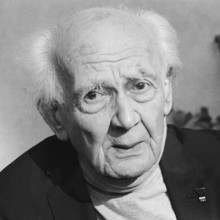Polish literature

Zygmunt Bauman
Born in 1925, Bauman is one of the best known sociologists and philosophers in the world. He is often mentioned as one of the principal creators of the concept "post-modernism". He primarily writes on the characteristics and trends of contemporary culture.
Bauman belongs to the generation that faced the task of rebuilding the splendid traditions of Polish learning after the war. In 1959, he published British Socialism, which he had written several years earlier. Since the outset of his career, Bauman's intellectual integrity has been coupled with a great talent for essay writing and reaching lay readers, which have borne such fruits as Everyday Sociology and Ideas, Ideals and Ideology. In these works, the seeds of his later philosophical originality can already be seen. In March, 1968, while Zygmunt Bauman was Professor of Sociology at the University of Warsaw and Chairman of the General Sociology Department, he was suddenly stripped of his post and expelled from the university for political reasons by the communist authorities. He left Poland, but was remembered as the author of many books and sociology textbooks, as an outstanding teacher of younger sociologists, as well as the first editor-in-chief of Studia Sociologiczne. While abroad, he continued to develop his ideas and his original scholarly concepts. Bauman lectured at the Universities of Tel Aviv and Haifa in 1969-1971, and in 1971, he left for England and accepted a permanent post at the University of Leeds. He was also a visiting professor at many other universities like Berkeley and Yale, as well as in Canberra, St. John's and Copenhagen. He writes and publishes in English. His books have appeared in England, the United States, and various countries in Europe. Zygmunt Bauman was awarded the European Amalfi Prize in Sociology and the Social Sciences for Modernity and the Holocaust. Bauman seems intellectually closest to the neopragmatism of Richard Rorty. Bauman finds Rorty's interpretative pluralism especially congenial. This is particularly important in relation to the aesthetic and moral questions that are most important to Bauman, particularly in his highly original treatment of the Holocaust. As he states in Modernity and the Holocaust, the Shoah "emerged as the result of an extraordinary accumulation of factors, each of which was completely ordinary and normal by itself, and the responsibility for that accumulation must be attributed to the modern state".
BIBLIOGRAPHY
- Hermeneutics and Social Science, New York: Columbia University Press, 1978.
- Memories of Class: the pre-history and after-life of class, London-Boston: Routhledge & Kegan Paul, 1982.
- Legislators and interpreters - On Modernity, Post-Modernity, Intelectuals, Ithaca, N.Y.: Cornell University Press, 1987.
- Freedom, Philadelphia: Open University Press, 1988.
- Modernity and The Holocaust, Ithaca, N.Y.: Cornell University Press, 1989.
- Thinking Sociologically. An introduction for Everyone, Cambridge, Mass.: Basil Blackwell, 1990.
- Modernity and Ambivalence, Ithaca, N.Y.: Cornell University Press, 1991.
- Intimations of Postmodernity, London, New York: Routhledge, 1992.
- Mortality, Immortality and Other Life Strategies, Stanford, CA: Stanford University Press, 1992.
- Postmodern Ethics, Life in Fragments. Essays in Postmodern Morality, Cambridge, Mass.: Basil Blackwell,1995.
- Postmodernity and its discontents, New York: New York University Press, 1997; Ponowoczesność jako żródło cierpień, Warszawa: Sic!, 2000
- Work, consumerism and the new poor, Philadelphia: Open University Press, 1998.
- Globalization: the human consequences, New York: Columbia University Press, 1998.
- Culture as praxis, Thousand Oaks, Calif.: Sage Publications, 1999.
- Globalizacja, Warszawa: PIW, 2000.
- Razem osobno, Kraków: Wydawnictwo Literackie, 2003.
- O pożytkach z wątpliwości. Rozmowy z Zygmuntem Baumanem, Warszawa: Sic!, 2003.
- Życie na przemiał, Kraków: Wydawnictwo Literackie, 2004.
- Europa. Niedokończona przygoda, Kraków: Wydawnictwo Literackie, 2005; II wyd. 2012.
- Płynna nowoczesność, Kraków: Wydawnictwo Literackie, 2006.
- Społeczeństwo w stanie oblężenia, Warszawa: Sic!, 2006.
- Moralność w niestabilnym świecie. Poznań: Księgarnia św. Wojciecha, 2006.
- Płynne czasy, Warszawa: Sic!, 2007.
- Płynne życie, Kraków: Wydawnictwo Literackie, 2007.
- Szanse etyki w zglobalizowanym świecie. Kraków: Znak, 2007.
- Płynny lęk. Kraków: Wydawnictwo Literackie, 2008.
- Wspólnota. W poszukiwaniu bezpieczeństwa w niepewnym świecie. Kraków: Wydawnictwo Literackie, 2008.
- Nowoczesność i zagłada, Kraków: Wydawnictwo Literackie, 2009; II wyd. 2012.
- Sztuka życia, Kraków: Wydawnictwo Literackie, 2009.
- Konsumowanie życia. Kraków: Wydawnictwo Uniwersytetu Jagiellońskiego, 2009.
- Życie w kontekstach. Rozmowy o tym, co za nami i o tym co przed nami, Warszawa: Wydawnictwa Akademickie i Profesjonalne, 2009.
- Żyjąc w czasie pożyczonym (rozmowy z Citlali Rovirosa-Madrazo), Kraków: Wydawnictwo Literackie, 2011.
- 44 listy ze świata płynnej rzeczywistości, Kraków: WL, 2011.
- Kultura w płynnej nowoczesności, Warszawa: Agora S.A., 2011.
- To nie jest dziennik, Kraków: Wydawnictwo Literackie, 2012.
TRANSLATIONS
croatian:
- O bogu i čovjeku, tłum. Mladen Martić, Zagrzeb: Naklada Ljevak, 2014.
german:
- Dialektik der Ordnung: die Moderne und der Holocaust (Modernity and The Holocaust). Hamburg: Europäische Verlags-Anstalt 1992.
- Moderne und Ambivalenz: das Ende der Eindeutigkeit (Modernity and Ambivalence). Hamburg: Junius 1992.
- Ist der Holocaust wiederholbar? Wiesbaden: HLZ 1994.
- Tod, Unsterblichkeit und andere Lebensstrategien (Mortality, Immortality and Other Life Strategies). Frankfurt am Main: Fischer 1994.
- Ansichten der Postmoderne (Intimations of Postmodernity). Hamburg: Argument-Verlag 1995.
- Postmoderne Ethik (Postmodern Ethics). Hamburg: Hamburger Ed. 1995.
- Soziologisch denken (Thinking Sociologically). Frankfurt am Main: Suhrkamp 1996.
italian:
- Il disagio della postmodernita (Ponowoczesność jako źródło cierpień) trans. Vera Verdiani, Torino: Bruno Mondadori 2002.
ukrainian:
- Plinni czasi [Płynny czas], trans. Anton Marciński, Kiev: Instytut Krytyki, 2013.